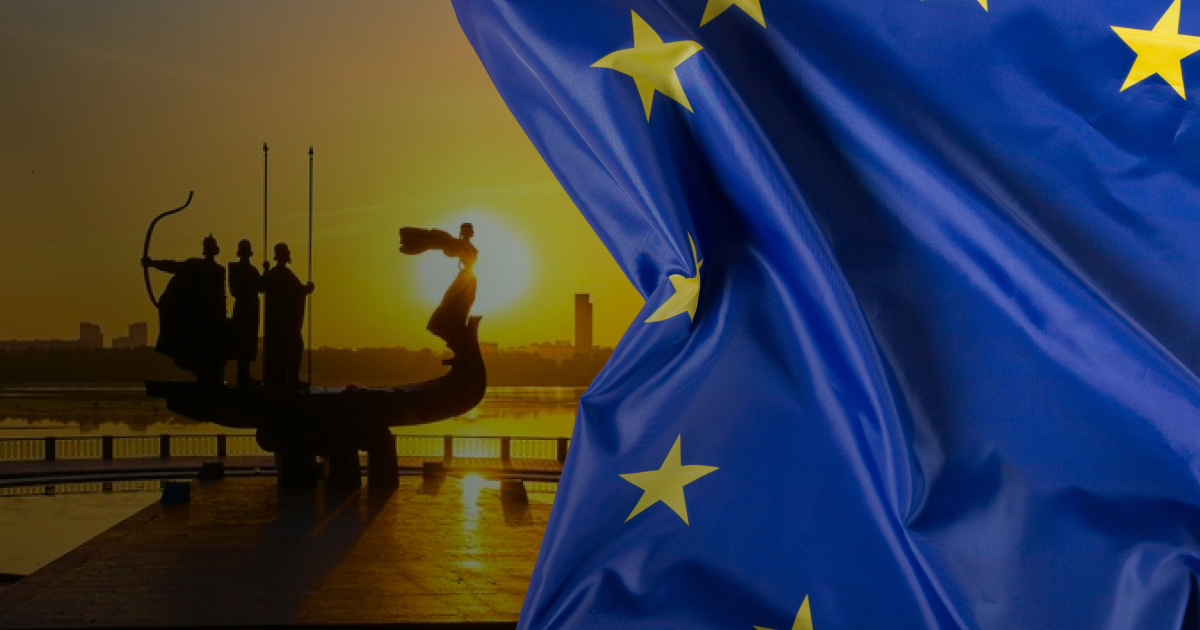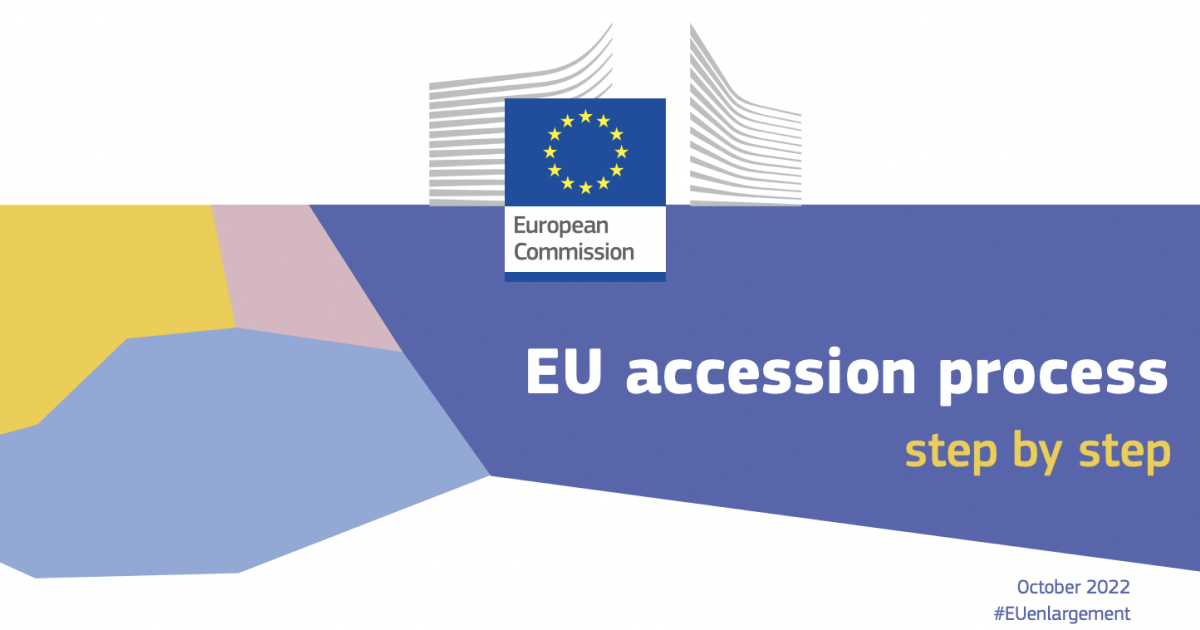What will Ukraine gain from EU membership and the EU from Ukraine's joining?

On November 8, the European Commission recommended that EU states open negotiations on Ukraine's accession to the European Union. According to the President of the European Commission, Ursula von der Leyen, Ukraine has implemented 90% of the recommendations put forward by the Commission after it was granted candidate status.
On December 13-15, member states will decide whether to open membership negotiations with Ukraine at the EU leaders' summit. The European Commission will launch the membership negotiations if the decision is positive.
Read more about the negotiation process and membership benefits for Ukraine and the EU in this article.
Negotiation process: how is it going, and at what stage?
The negotiation process in the European Union is quite detailed and carefully prescribed. Each country admitted to the process follows the same path of implementing European law into its legislation.

There are 35 chapters. The implementation chapters deal with the issues on which the candidate country will coexist in the European Union with other members. These include the free market, freedom of movement for workers, visa issues, financial services, social policy, justice, the judiciary and even the fisheries.
The European Commission divides the process into three stages: obtaining candidate status; opening the negotiation process through a vote of all member states and conducting it on the implementation of sections of European law; completion of the negotiation process; and ratification of the accession agreement.
Ukraine was granted candidate status in 2022 and is now close to opening membership negotiations. If the Council of the European Union successfully votes, the country will enter the second stage of the process, the longest and most complex.

The negotiations are conducted by ministers and ambassadors of the EU governments at an intergovernmental conference, which is convened on purpose: they analyse the country's legislation and its compliance with EU law and determine what needs to be implemented.
The priorities in the negotiations are constantly changing, says Oleksandr Shnyrkov, PhD in Economics, Associate Professor of International Business at the Taras Shevchenko National University of Kyiv, Institute of International Relations, to Svidomi.
There are seven prerequisites for starting negotiations between the EU and Ukraine, for example, economy, politics, corruption, freedom of speech, etc. All these areas will be negotiated. While we have made progress on economic issues, the achievements in other areas are not so significant — we are talking about corruption and independent anti-corruption bodies. There are also issues related to freedom of speech,
explains Oleksandr Shnyrkov.
The European Commission also prepares and submits a report on the negotiation process for each chapter, the implementation of EU law and the candidate country's readiness for accession. Negotiations are considered completed if the Council of the European Union makes a positive decision. The process itself is completed only after each chapter is closed.
The European Commission can leave the science and research chapter in the process, provided that an action plan is created to implement these parts into the national legislation of the candidate country in the future.
The justice chapter also defines the Schengen agreements on the abolition of controls at the internal borders of the union. However, accession to the EU does not automatically mean accession to the Schengen Agreement. It is implemented after a decision of the Council of the European Union for an EU member. For example, Croatia became a member of the EU in 2013 but joined the Schengen area at the end of 2022.
The negotiation process takes a long time and depends on the decisions of both the candidate country and the Council of the European Union. Croatia and the EU started negotiations in 2005 and completed them in 2011. Serbia became a candidate for the EU in 2012 and is now in the second stage of the negotiation process.
Olha Stefanishyna, Deputy Prime Minister for European and Euro-Atlantic Integration, believes that Ukraine will be able to implement all the commitments of the negotiation process and prepare for the ratification of the agreement to become a member of the European Union in two years.

We have made progress in certain chapters of these negotiations and are making progress thanks to the Association Agreement with the EU. But back then, it was easier to reach an agreement because we were required to integrate about 450-500 acts. Now, Stefanyshyna says there are 8,000 adopted acts and about 2,500 more that still need to be integrated. It should also be noted that EU legislation is constantly changing, so there may be new acts,
says Shnyrkov.
Katarína Mathernová, the EU Ambassador to Ukraine, commented to Ukrainska Pravda that Ukraine will join the EU in 2030 on the condition of hard work. She also said that the European Union "should be ready to expand beyond the current 27 member states. Without a change in the voting system, the number of EU members in the decision-making system cannot increase indefinitely."
Andrii Martynov, Doctor of Historical Sciences, Professor and Senior Research Fellow at the Department of History of International Relations and Foreign Policy of the National Academy of Sciences of Ukraine, believes that the issue of negotiations depends on both Ukraine and the European Union — Hungary may veto the accession.
The EU-Ukraine direction: how will the EU help Ukraine?
Accession to the European Union is correlated with each country's economic growth, investment and infrastructure development. Poland finalised the negotiation process and became an EU member in 2004. It joined with the following economic indicators (as of 2003):
- nominal GDP - almost USD 200 billion.
- inflation rate - 0.8%.
- unemployment rate - 20%. This figure has been growing since 1998.
Immediately after the accession, unemployment began to decline in the country, from 20% to 18%. The government debt has decreased as a percentage of GDP, although it grew between 2000 and 2003.
According to research, Poland's GDP structure changed after joining the European Union due to investments. While agriculture accounted for 40% of GDP in the early noughties, EU funds and private investors started investing in the country after joining the EU.
They invested in the development of mechanical engineering and machinery production. As of 2014, Poland became Europe's largest producer of sophisticated household appliances, overtaking Italy and Germany.
However, a new EU member does not always have full access to the common market. Romania's access to the agricultural market was restricted even after gaining membership in 2007. The EU governing bodies did this to limit the possibility of a market crash due to the influx of cheap products and to make the transition smooth for all market players.
Ukraine's economy after the full-scale invasion
Since the beginning of Russia's full-scale invasion in 2022, Ukraine's economy has collapsed: GDP by almost 30%, exports — due to Russia's blockade of seaports in the Black Sea — by 42%. The unemployment rate rose to 21%.
In the summer of 2022, the National Bank of Ukraine sharply raised its key policy rate from 10% to 25%. This indicator indicates a sharp rise in inflation — in December 2022, the NBU recorded 26%.
In 2023, the indicators improved: consumer inflation fell to 5.6%, GDP came out of decline and stopped at +2%, and the government recorded an unemployment rate of 19% (as of October 2023).

The ongoing war is also causing damage and threatening state institutions. According to the NBU's research, the main problems are damage to infrastructure, large-scale emigration, and growing imbalances in the labour market. The NBU has calculated that over $411 billion is currently needed for reconstruction.
In the potential post-conflict period, Ukraine expects to increase investment levels to 30-35% of GDP over eight years. Investments of various types, both private and international, can become the most significant stimulus for macroeconomic growth. The EU's support in the form of investment funds in Ukraine and private investment insurance will potentially boost the economy, especially if Ukraine joins the EU.
"Ukraine is interested in the prospect of membership, so it continues to implement EU law despite Russia's full-scale aggression," says Shnyrkov, "The process is going better in some aspects and worse in others."
Ukraine-EU direction: what can Ukraine offer the EU?
While Ukraine's integration into the European Union is a promising opportunity for economic growth, stabilisation of state institutions and development of the country as a whole, the European Union will get a country with high unemployment, low nominal GDP of only $160 billion, and high government debt, which the government expects to reach 106% of the country's GDP.
There are already those among the member states who oppose accession. Hungary justifies its position by saying that Ukraine is "not ready" for membership and is unwilling to provide funding.
In 2022, the Office of the President of Ukraine reported that the Netherlands, Austria, and Ireland were "problematic" to Ukraine's accession. Germany also opposed it but changed its mind and supported accession.
"We see great chances for both sides in this membership. In terms of economic cooperation, we believe that Ukraine's membership in the EU will greatly benefit both Germany and Ukraine," German Ambassador to Ukraine Martin Jäger told Ukrinform.

Andrii Martynov believes the EU is interested in Ukraine primarily because of its territorial and security situation.
Ukraine's integration into the European Union completes the process of uniting Eastern and Western Europe. Europe's historical frontier (border) as a "grey security zone" will finally disappear. That is, the European Union will be able to become a geopolitically self-sufficient player in the international arena. Ukraine's accession to the EU will mean the formation of a network of interaction between European regions from the Baltic to the Black Sea and will revive the Three Seas Initiative, which will include the Baltic, Black and Adriatic Sea states,"
he tells Svidomi.
Martynov believes that the process around Ukraine will allow Türkiye to be integrated as well, as the EU's borders will become closer (Türkiye applied for membership in 1987, negotiations began in 2005, and in 2016 they were frozen by the European Parliament due to "human rights violations and a lack of rule of law" — ed.)
The Ukrainian market is attractive for investment. German Ambassador to Ukraine Martin Jäger says that Ukraine's membership in the EU is a "great economic opportunity". According to him, German companies are interested in investing in Ukraine, especially in renewable energy.
Andrii Martynov, Senior Research Fellow at the Department of History of International Relations and Foreign Policy of the National Academy of Sciences of Ukraine, agrees that Ukraine's accession to the EU will stimulate economic growth in Ukraine and European countries.
Ukraine is profitable and interesting for its mineral resources. Ukraine's participation in the functioning of the four European freedoms (movement of goods, capital, labour and investment) will give the EU's common market a new impetus for development,
he concludes.


